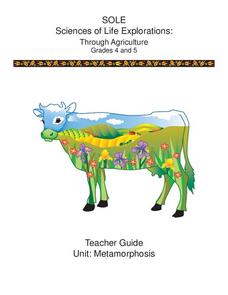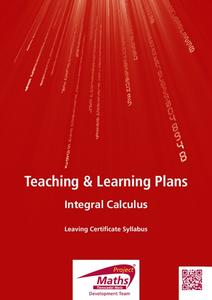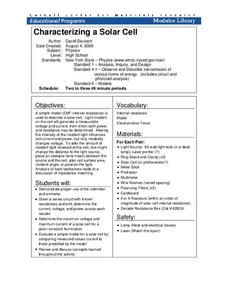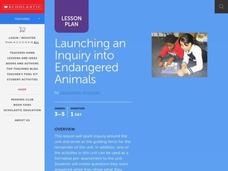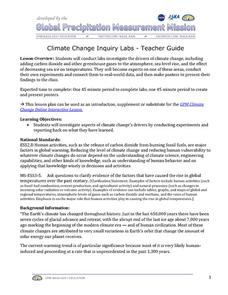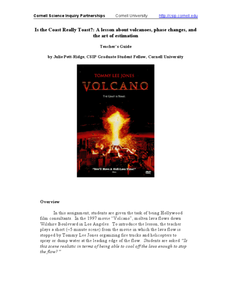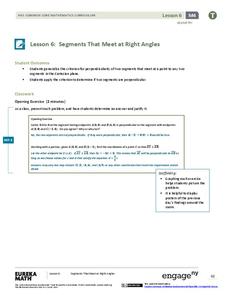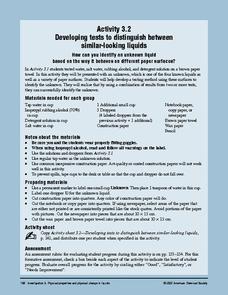Cornell University
Metamorphosis
Looking for an insect unit that addresses multiple skill strategies? Young entomologists explore multiple life cycles of insects that go through metamorphosis. The brainteasers and mobile activity spark learner interest before guiding...
American Physiological Society
Did I Observe it or Infer it?
Take the mystery out of inquiry! When young scientists learn to use their keen powers of observation to make smart inferences about a situation, they are well on their way to understanding what the scientific method is all about. Using...
NASA
Catch a Piece of the Sun
What does the sun mean to you? Learners have many different interests that may have connections to the sun. Whether its solar radiation, solar flares, or solar storms, there are connections to daily interests that may surprise your...
National Nanotechnology Infrastructure Network
Hiding Behind the Mask
Microchips are a man-made wonder. Investigate the manufacturing wonder with a hands-on inquiry-based lesson. Scholars simulate the process of pattern transfer using photoresist. Their conclusion identifies how their process replicates...
Project Maths
Integral Calculus
From derivatives to antiderivatives and back again. Building on the second lesson of the three-part series covering functions, learners explore the concept of an antiderivative. They connect the concept to the graph of the function and...
Cornell University
Characterizing a Solar Cell
Young classes are sure to get a charge out of this instructional activity! Learners experiment with circuits of a solar cell. They practice determining current, voltage, and power for the circuit and maximize the voltage and current of...
Perkins School for the Blind
Conductors of Heat - Hot Spoons
Why is the end of a spoon hot when it's not all the way in the hot water? A great question deserves a great answer, and learners with visual impairments will use their auditory and tactile senses to get that answer. A talking...
Curated OER
Volcanism (part 1 of 3)
Learners explore the factors that control magma viscosity and study about the characteristics of volcanic eruptions. Lesson describes collaborative group exercises and guided inquiry methods.
Curated OER
Sedimentary Rocks
Sedimentary rocks are the building blocks of this geology lesson. In it, learners discover what sedimentary rocks are and how they form. They understand the differences between the major sedimentary rock varieties and learn what types of...
Curated OER
Pulling It All Together
Students review data about a health problem and prepare an investigative report. Teams trade reports and utilize skills developed from previous lessons to evaluate the critical thinking evident in the reports.
Curated OER
Bird Buffet
Fifth graders investigate how birds use their beaks. In this agriculture lesson, 5th graders use tools to simulate how birds gather food with their beaks. They then draw conclusions about certain types of beaks and what types of food a...
Curated OER
John Brown Lesson Plan
Students investigate John Brown. In this U.S. history slavery lesson, students view a PowerPoint presentation about John Brown. Students discuss the North's and South's reaction to John Brown's raid, and determine whether they think...
Curated OER
Launching an Inquiry into Endangered Animals
Students create questions they want answered while they show what they comprehend about endangered and extinct species. They categorize photos of living things onto a contunum with the main points for use as a formative assessment.
Curated OER
Lesson Idea: A Box Full of Science
Students analyze and study a shoe box of simple objects. They experience a homemade alternative to a company box of commercial kits for science. Each student creates their own shoe box of simple objects to share with their classmates.
NASA
Climate Change Inquiry Lab
With global temperatures on the rise faster than ever recorded, the effects of a heating planet could be devastating. Allow learners to discover just what the world is in store for if the warming continues through a series of videos, a...
Curated OER
Is the Coast Really Toast?: A Lesson About Volcanoes, Phase Changes, and the Art of Estimation
Clever! Use a clip from the 1997 film, Volcano, to get your chemistry class knee-deep in heat concepts related to lava. In the movie scene, lava flow is stopped in the nick of time. Your class must use calculations to determine if this...
Center for Learning in Action
Density
Explore the concept of density within states of matter—gases, liquids, and solids—through a group experiment in which young scientists test objects' texture, color, weight, size, and ability to sink or float.
EngageNY
Segments That Meet at Right Angles
Can segments be considered perpendicular if they don't intersect? Learners look at nonintersecting segments on the coordinate plane and make conclusions about the lines that contain those segments. They determine if they are...
Discovery Education
Jets in Flight
This Discovery Education activity provides the information needed to understand the basics of flight. Before taking off, young pilots learn the eight stages of the engineering design process. Small groups then design and build an...
National Museum of the American Indian
The A:Shiwi (Zuni) People: A Study in Environment, Adaptation, and Agricultural Practices
Discover the connection of native peoples to their natural world, including cultural and agricultural practices, by studying the Zuni people of the American Southwest. This instructional activity includes examining a poster's...
American Chemical Society
Developing Tests to Distinguish Between Similar-Looking Liquids
Each group talks about how to test unknown liquids based on their findings in the previous experiment. In this second of four activities, they test unknowns on wax paper, newspaper, and construction paper. As a stand-alone, this lesson...
Curated OER
Measuring Precipitation
A little engineering design is mixed into this lesson on precipitation measurement. Groups plan and construct a rain gauge, and use it to collect precipitation. As part of the PowerPoint presentation, learners view a satellite map of...
Albert Shanker Institute
Economic Causes of the March on Washington
Money can't buy happiness, but it can put food on the table and pay the bills. The first of a five-lesson unit teaches pupils about the unemployment rate in 1963 and its relationship with the March on Washington. They learn how to create...
3C Skills Collaborative
Skill Twenty: Sell Successfully
"Selling is important in all professions because it involves synthesizing information and persuading people." Rather than using this as a lesson on how to sell a product, this resource might best be used as an inquiry into what goes into...


